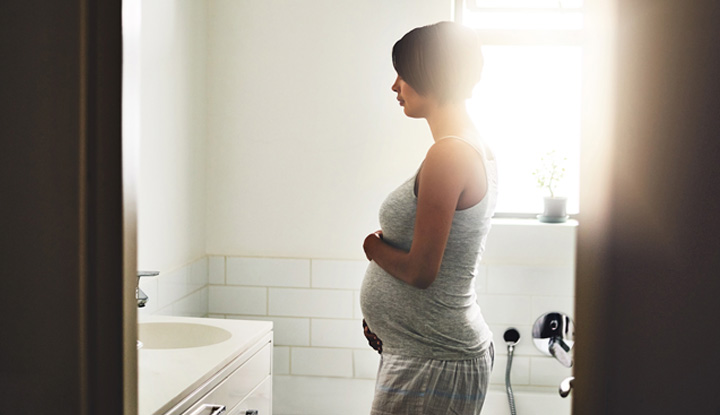Constipation is a common, unpleasant part of pregnancy. But there are simple, straightforward lifestyle changes you can make to get relief. Your healthcare provider can recommend medications that may help, too. Usually, your symptoms will resolve after you have your baby.
Advertisement
Cleveland Clinic is a non-profit academic medical center. Advertising on our site helps support our mission. We do not endorse non-Cleveland Clinic products or services. Policy

Image content: This image is available to view online.
View image online (https://my.clevelandclinic.org/-/scassets/images/org/health/articles/21895-pregnancy-constipation-959085190)
Having constipation means that you’re struggling to poop, or have a bowel movement. It happens when the food that your body no longer needs (waste) hardens in the lower part of your digestive tract (bowel) instead of moving out as a stool. Most people have had the unpleasant experience of being constipated before, but it’s even more common when you’re pregnant. The hormone changes in your body that make pregnancy possible can increase your chances of becoming constipated.
Advertisement
Cleveland Clinic is a non-profit academic medical center. Advertising on our site helps support our mission. We do not endorse non-Cleveland Clinic products or services. Policy
You may start to feel constipated once the hormone levels in your body increase to support your pregnancy. The changes can happen as early as the second or third month of your first trimester.
About 16 to 39% of women get constipated at some point during pregnancy. You’re most likely to get constipated in the third trimester, when the fetus is heaviest and putting the most pressure on your bowel. Constipation can happen in all three trimesters, though. Sometimes, you’ll continue to be constipated up to three months after the baby’s born.
Hormone changes in your body during pregnancy and your daily habits can increase your chances of constipation. Causes for constipation during pregnancy include:
Advertisement
Releasing a stool feels satisfying. Constipation feels just the opposite. You can tell you’re constipated when:
Sometimes, constipation leads to or worsens hemorrhoids and anal fissures. Like constipation, both conditions are common during pregnancy.
You may feel constipated during pregnancy, but being constipated doesn’t mean you’re pregnant. There are better ways to tell if you’re pregnant, like taking a pregnancy test.
Your healthcare provider may ask you how much you’re pooping and what your stools look like. Other questions about your daily habits can help your provider find out what’s likely causing your constipation or making it worse. Your provider may ask:
You can’t stop pregnancy hormones from making it harder for you to poop, but you can make other changes that can help.
If you can’t get relief through lifestyle changes, your healthcare provider may prescribe a laxative or a fiber supplement that can help. Always check with your provider before taking any laxatives or supplements, though. Not all of them have been tested for safety and effectiveness during pregnancy. Avoid home remedies for constipation, like castor oil or mineral oil, unless your provider recommends you take them.
Some laxatives can cause you to become dehydrated and imbalance your electrolytes. This is why it’s so important to be sure that you’re taking the right laxative and that you’re taking it for the right amount of time. Speak to your provider to be sure.
After you’ve had your baby and your hormone levels begin to return to their pre-pregnancy levels, your bowel movements will likely return to normal.
You can reduce your risk of becoming constipated by doing the same things you would do to manage constipation. Pay attention to how much fiber you’re eating and fluids you’re drinking. Schedule exercise that feels doable for you. Walking, swimming, yoga, pilates and light aerobics are all good options to keep your bowel active.
Reach out to your provider if you’ve been constipated for longer than a few weeks. Don’t dread trips to the bathroom when your provider can help you. Be sure to get your provider’s OK on any medication you take when you’re pregnant. This includes fiber supplements and laxatives.
Advertisement
No. All the pressure that builds up in your belly because of constipation may make you worry for your baby. But don’t stress. Constipation may be unpleasant for you, but it won’t harm your baby.
You may have to make some changes to manage constipation when you’re pregnant. But there are straightforward things you and your provider can do to help get you relief. The foods you eat, the fluids you drink, the exercise you do and the medicine you take all make a difference when it’s time to visit the toilet. Put good habits into place so that your memories of pregnancy don’t include having to suffer through uncomfortable bowel movements.
Advertisement
Learn more about the Health Library and our editorial process.
Cleveland Clinic's health articles are based on evidence-backed information and review by medical professionals to ensure accuracy, reliability, and up-to-date clinical standards.
Cleveland Clinic's health articles are based on evidence-backed information and review by medical professionals to ensure accuracy, reliability, and up-to-date clinical standards.
From routine pelvic exams to high-risk pregnancies, Cleveland Clinic’s Ob/Gyns are here for you at any point in life.
